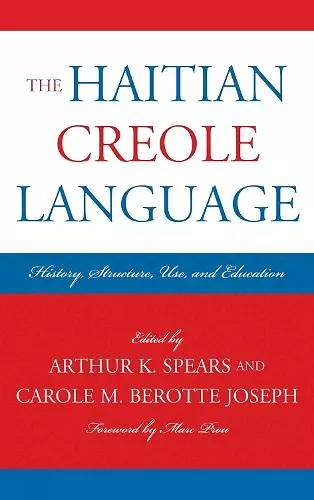The Haitian Creole Language
History, Structure, Use, and Education
Arthur K Spears editor Carole M Berotte Joseph editor
Format:Hardback
Publisher:Lexington Books
Published:22nd Jun '10
Currently unavailable, and unfortunately no date known when it will be back
This hardback is available in another edition too:
- Paperback£47.00(9780739172216)

The Haitian Creole Language is the first book that deals broadly with a language that has too long lived in the shadow of French. With chapters contributed by the leading scholars in the study of Creole, it provides information on this language's history; structure; and use in education, literature, and social interaction. Although spoken by virtually all Haitians, Creole was recognized as the co-official language of Haiti only a little over twenty years ago. The Haitian Creole Language provides essential information for professionals, other service providers, and Creole speakers who are interested in furthering the use of Creole in Haiti and the Haitian diaspora. Increased language competencies would greatly promote the education of Creole speakers and their participation in the social and political life of their countries of residence. This book is an indispensable tool for those seeking knowledge about the centrality of language in the affairs of Haiti, its people, and its diaspora.
This groundbreaking volume has the principal purpose of substantiating that HC [Haitian Creole] is a legitimate language that is vital in the education of HC-speaking students. . . .The strength of The Haitian Creole Language is its examination of HC through multiple lenses, providing a broad scope of the language that substantiates the legitimacy of HC. . . .With this unprecedented volume, S[pears] & J[oseph] have provided the first book to introduce readers to an extensive range of information on HC. In addition, their work more broadly contributes to the conversation and research on creole languages worldwide and on creole languages in the Caribbean in particular, benefiting a wide range of audiences, including teacher educators, researchers on Haiti, creole linguists, and even readers with a general interest in Haiti. * Journal Of Pidgin and Creole Languages *
This book presents a rich global take on language practice in Haiti and the Haitian Diaspora, especially in North America. The contributors, most of them established Haitian scholars, present informative perspectives on the colonial and post-colonial history of Haiti (focusing on the contacts of populations and of their languages, as well as on the consequences of the gradual demise of its formal economy since the Haitian Revolution). They also explore the emergence and structures of Haitian Creole, its ethnographic status against that of French, and issues regarding its graphic system and its use in education. Linguists and non-linguists alike will appreciate having so much useful information provided in a prose that is very accessible. Spears and Joseph have set an outstanding example that can be followed for other creole vernaculars. -- Salikoko S. Mufwene, University of Chicago
This book could not be more timely, when so many observers worldwide are analyzing Haiti as they assist in the rebuilding of this long beleaguered nation. As it turns out, one of the fundamental impediments in building a better Haiti for all has long been a thorough misuse of language in its education system: French is still used as the major language of instruction even though it is, in effect, a foreign language for the majority of Haitians. These chapters will instill better knowledge and respect of Haiti and Haitian Creole and will promote Haiti's national language both as an indispensable language of instruction at all levels of Haiti's education system and as an important topic of research in Haiti and beyond. Such promotion of Haitian Creole will contribute to the socioeconomic betterment of monolingual Haitian Creole speakers-the vast majority of Haitians in Haiti. Altogether the contributors to this anthology are to be commended for their exemplary use of scholarship toward progressive social change. The book's lucid analyses of the impact of neo-colonial ideology on language policy are also relevant to language-related social struggles outside of Haiti (witness, say, the "Ebonics" debate in the U.S.). -- Michel DeGraff, Massachusetts Institute of Technology
ISBN: 9780739112366
Dimensions: 240mm x 163mm x 26mm
Weight: 649g
320 pages